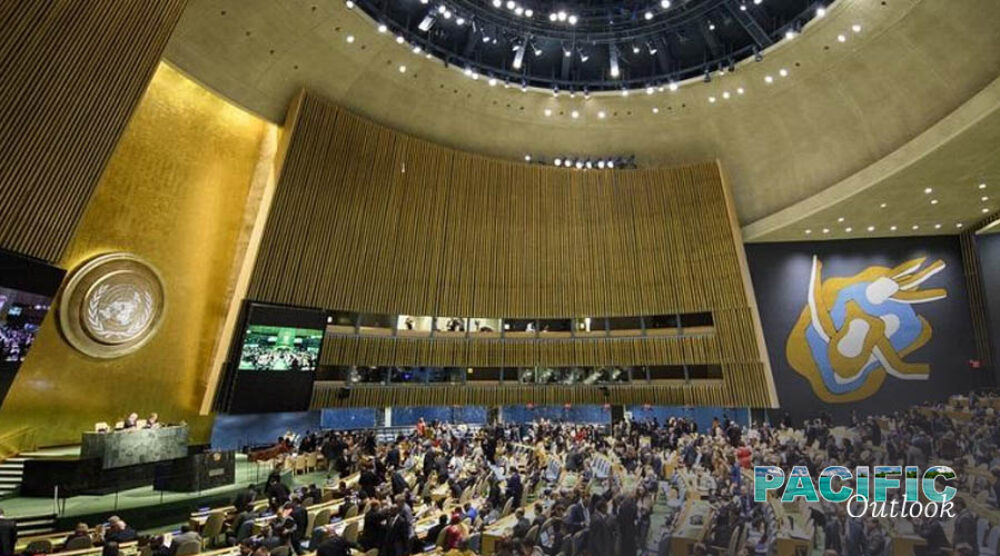The 77th United Nations General Assembly (UNGA77) motto was “a watershed moment: transformative solutions to interlocking challenges,” with member states encouraged to come prepared to develop transformative solutions to global challenges. This was heeded by the leaders of the Pacific who spoke with influence across a range of topics, but with a consistent theme—“The Pacific’s challenges are the world’s challenges.”
Climate Change
President Nikenike Vurobaravu of Vanuatu asked movingly for climate change to be measured in human lives rather than degrees or tons of carbon before calling for the development of a Fossil Fuel Non-Proliferation Treaty that would see coal, oil and gas phased down to a level consistent with the 1.5° target, and a fair transition for workers, communities and nations dependent on fossil fuels.
Tuvalu and the Marshall Islands launched the ‘Rising Nations Initiative’ on the sidelines of UNGA77. The Initiative calls for a ‘global settlement that guarantees nation states … a permanent existence beyond the inhabitable lifetime of our atoll homes’.
COP27 was high on the agenda for the Pacific representatives in the General Debate and at side events such as the Alliance of Small Island States’ Leaders Breakfast and the Island Resilience Forum: SC1.5NCEnotSILENCE. The Federated States of Micronesia and Solomon Islands used their addresses to the General Assembly to call for action on loss and damage as a result of climate change and provision for a Loss and Damage Finance Facility to be placed on the COP27 agenda.
Geopolitics
The Pacific Island Forum (PIF) countries came ready to present the Pacific as stewards of the Blue Pacific Continent. “Together, we are an oceanic superpower,” said Fijian Prime Minister and PIF Chair Voreqe Bainimarama during the global launch of the ‘2050 Strategy for the Blue Pacific Continent’ at UNGA77. He drew a polite, but firm line in the sand in front of the watching eyes of world leaders and representatives—Pacific countries intend to protect the ocean that is their home, the source of their livelihoods and economic potential, and the world’s largest carbon sink; they intend to become resilient and independent, particularly economically; and they expect the rest of the world to cooperate with them, as equals.
It seems the world is listening. US Secretary of State Antony Blinken co-chaired the first Ministerial Meeting of the Partners of the Blue Pacific alongside Prime Minister Bainimarama on the margins of UNGA77. The meeting was attended by the current full members of the Partnership (the US, Australia, the UK, New Zealand and Japan) with Korea, India, Germany, Canada and France in attendance and expressing their interest in joining.
The Pacific islands ‘friends to all and enemies to none’ foreign policy approach was reiterated by the Federated States of Micronesia and Solomon Islands. Solomon Islands Prime Minister, Manasseh Sogavare, rebuked those who have critiqued their growing partnership with China but also called for peace in the Taiwan Strait. Leaders of Marshall Islands, Nauru, Palau and Tuvalu all called for Taiwan’s formal inclusion in the United Nations, reminding the assembly that ‘no one should be left behind’ in implementing the Sustainable Development Goals (SDGs).
Peace and Security
With the Pacific island representatives ready to affirm their commitment to the SDGs, and express their concern the world is not on track to meet the 2030 Agenda, the voices of the Pacific Island nations also provided a consistent rallying cry for greater multilateralism. Secretary-General Antonio Guterres praised the PIF Leaders for their ‘powerful, consistent and united voice’.
The SDGs were linked to the COVID-19 recovery efforts and the financial difficulties faced by Small Island Developing States (SIDS). Nauru, Palau, Papua New Guinea, Samoa, Solomon Islands, Tonga and Vanuatu all called for greater support for the development of the Multidimensional Vulnerability Index (MVI) which would be used to determine external financing to help vulnerable countries recover from crises in place of the more inequitable measures of development, such as GNI per capita, which are traditionally used to determine the provision of financing.
UNGA77 coincided with the International Day for the Total Elimination of Nuclear Weapons and Pacific leaders took the opportunity to remind the Assembly of the ongoing relevance of Nuclear Non-Proliferation to the Pacific. Russia’s aggressions in Ukraine and blocking of consensus at the 10th Review of the Treaty on the Non-Proliferation of Nuclear Weapons in the leadup to UNGA77 were roundly condemned by Pacific leaders, who called for peace and greater multilateralism. Kiribati and Marshall Islands reminded the Assembly of the harm endured in their countries as a result of nuclear testing. Federated States of Micronesia, Marshall Islands, Tuvalu and Solomon Islands all expressed concerns over Japan’s plan to release treated water from the Fukushima nuclear site into the Pacific.
Pacific island representatives also raised concerns over abuses in West Papua and China’s Xinjiang region (Marshall Islands) and the ongoing embargo of Cuba as a human rights issue (Nauru, Solomon Islands, Tuvalu).
Wrap up
Pacific leaders were consistent in their messaging at UNGA77, demonstrating their commitment to solidarity, sustainability and science; and demonstrating their commitment to finding transformative solutions. Secretary-General Guterres praised the Pacific leaders for their strong, moral voices and implored them to not lose hope and continue to advocate loudly. As the global community begins to prepare for COP27 it is hoped that the voice of the Pacific, not just as a number of small islands but as a powerful ‘Blue Continent’ bloc, will be reflected in the agenda and results of the next major meeting of the world’s leaders.
Rachel Smith is a post-graduate research student at Griffith University. She is currently working for the Griffith Asia Institute as a Research Assistant.








